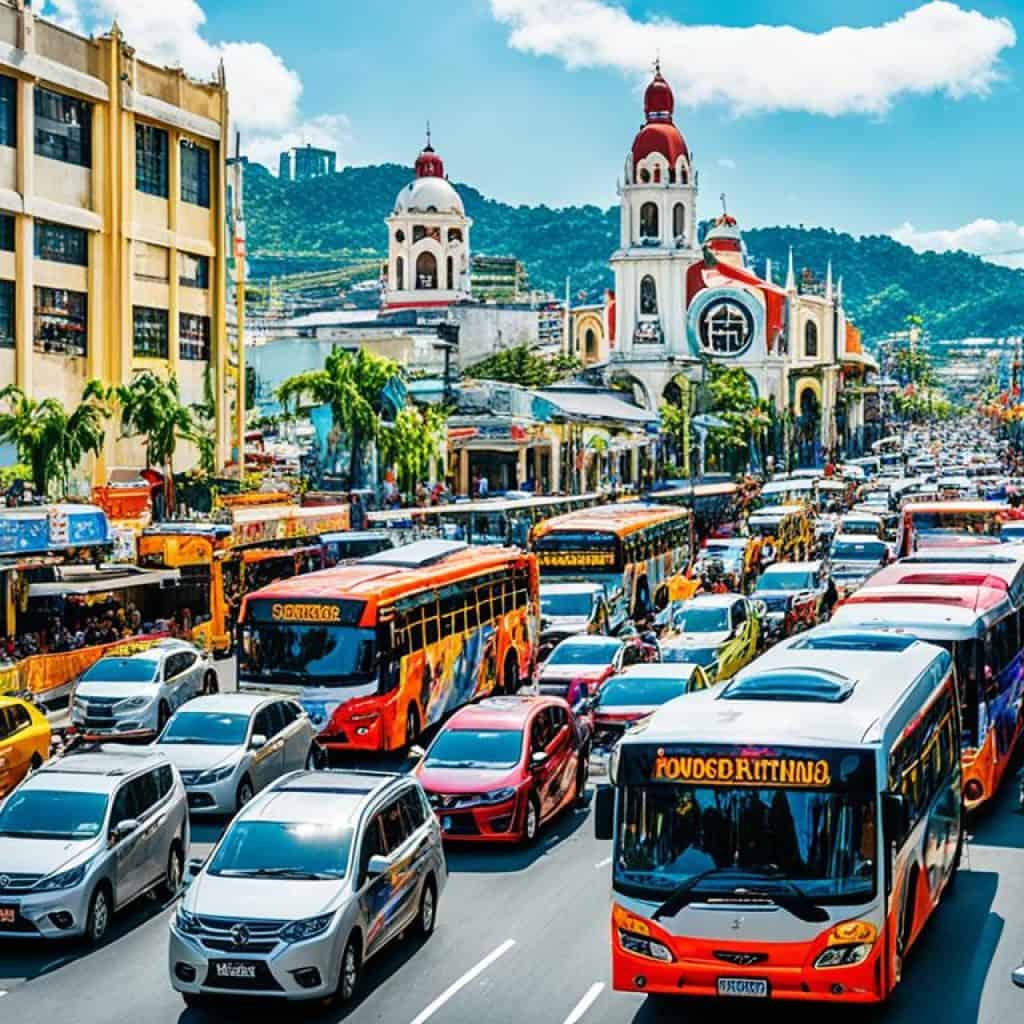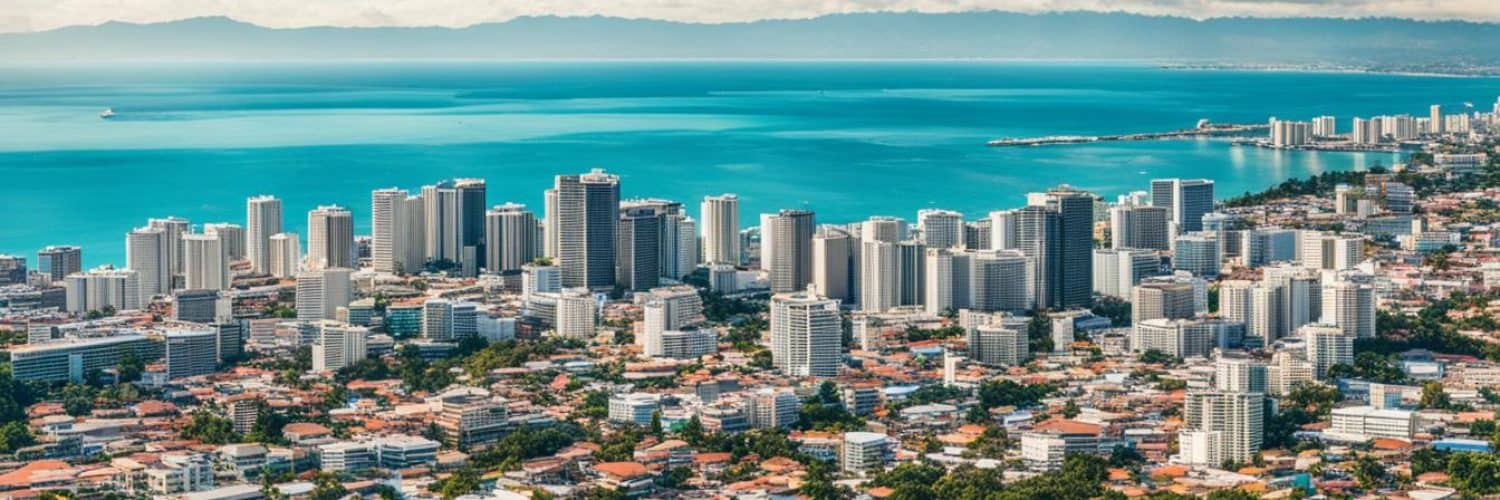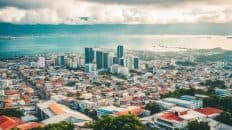Have you ever wondered how a city’s population can shape its identity, growth, and opportunities? In the case of Cebu City, its population dynamics are nothing short of fascinating. With an estimated population of 866,855 people in 2022, Cebu City is a thriving hub of diverse individuals, communities, and cultures. But what trends are driving this population growth? And what can these insights reveal about the city’s demographics and future outlook? Let’s dive into the numbers and discover the untold stories behind Cebu City’s population.
Key Takeaways:
- Cebu City’s population in 2022 stands at 866,855 people, reflecting a 1.3 percent increase from the previous year.
- The population is almost equally divided between males (50.2 percent) and females (49.8 percent).
- About 48.0 percent of the population resides in urban areas, while 52.0 percent live in rural areas.
- The median age of the population is 26.3 years.
- Stay tuned as we explore more fascinating insights into Cebu City’s demographics, internet usage, social media trends, economy, wealth distribution, labor market, and transportation infrastructure.
Cebu City Population by Age
The population of Cebu City is diverse and encompasses individuals from various age groups. As of 2022, the population is distributed as follows:
- 9.2 percent are between 0 and 4 years old.
- 16.0 percent are between 5 and 12 years old.
- 9.6 percent are between 13 and 17 years old.
- 12.8 percent are between 18 and 24 years old.
- 16.4 percent are between 25 and 34 years old.
- 12.8 percent are between 35 and 44 years old.
- 10.0 percent are between 45 and 54 years old.
- 7.2 percent are between 55 and 64 years old.
- 5.9 percent are aged 65 and above.
This age distribution provides valuable insights into the demographics of Cebu City, showcasing the broad representation of different age brackets within its population. From young children to older adults, the city’s inhabitants span across multiple generations, creating a diverse and vibrant community that contributes to the city’s rich culture and heritage.
To better understand the population dynamics and plan for future development, it is essential for policymakers and urban planners to consider the needs and preferences of individuals across all age groups, ensuring that Cebu City continues to thrive as a livable and inclusive city.
Insights from the Age Distribution:
- The proportion of children under the age of 12 is significant, accounting for a significant portion of the population. This emphasizes the importance of providing adequate educational facilities and child-focused services to support the city’s younger residents.
- The age group between 25 and 34 years old represents a substantial segment of the population, highlighting the presence of a vibrant working-age population. This demographic contributes to the city’s workforce and economic growth.
- The percentage of individuals aged 65 and above showcases the presence of an aging population in Cebu City, indicating the need for age-friendly infrastructure, healthcare services, and social support systems to cater to the unique needs of seniors.
The age distribution of Cebu City’s population reflects the diverse needs and aspirations of its residents across different life stages. By recognizing and addressing the requirements of each age group, the city can foster a supportive and inclusive environment that enhances the overall quality of life for all its inhabitants.
Internet Use in Cebu City
In January 2022, Cebu City had a significant number of internet users, with an estimated 76.01 million individuals actively using the internet. This represents a 2.8 percent increase compared to the previous year, indicating the growing digital presence in the city. The internet penetration rate in Cebu City stands at 68.0 percent of the total population, showcasing the widespread adoption of internet usage.
While a majority of the population is connected, it is important to note that 32.0 percent of the population remained offline at the beginning of the year, highlighting the need for further efforts to bridge the digital divide.
The median mobile internet connection speed via cellular networks in Cebu City is 18.68 Mbps, providing users with fast and reliable access to online content. Meanwhile, the median fixed internet connection speed is 46.44 Mbps, enabling seamless connectivity for households and businesses.

| Year | Internet Users (in millions) | Internet Penetration Rate |
|---|---|---|
| 2021 | 73.94 | 65.2% |
| 2022 | 76.01 | 68.0% |
As seen in the table, the number of internet users in Cebu City has steadily increased over the years, reflecting the growing reliance on digital platforms and services. The higher internet penetration rate signifies the accessibility and availability of internet connectivity in the city.
Social Media Usage in Cebu City
Cebu City boasts a vibrant social media presence, with a large number of users actively engaging on various platforms. As of January 2022, the city recorded a staggering 92.05 million social media users, accounting for an impressive 82.4 percent of the total population.
Leading the pack is Facebook, which dominates the social media landscape in Cebu City with 83.85 million users, representing 75.0 percent of the population. This highlights the platform’s popularity and widespread adoption among the city’s residents.
YouTube and Instagram also enjoy a significant user base in the city, with 56.50 million and 18.65 million users respectively. These platforms provide avenues for creative expression, video content consumption, and visual storytelling, catering to diverse user interests.
The growth rate of social media users in Cebu City continues to rise, with an estimated increase of 3.4 percent between 2021 and 2022. This highlights the growing importance of social media as a communication and content-sharing medium within the community.
“Social media has become an integral part of daily life in Cebu City, enabling residents to connect, share, and express themselves in unprecedented ways.”
As the proliferation of social media platforms continues, it’s important to note that the aforementioned figures may not represent unique individuals. With the increasing reliance on social media for various purposes, it’s evident that Cebu City’s social media penetration is a force to be reckoned with.
Let’s take a closer look at the social media landscape in Cebu City:
Social Media Usage in Cebu City
| Platform | Number of Users (in millions) | Percentage of Total Population |
|---|---|---|
| 83.85 | 75.0% | |
| YouTube | 56.50 | 52.0% |
| 18.65 | 17.0% |
With the increasing number of social media users, Cebu City is undoubtedly an active hub for digital interactions and online engagement. From staying connected with friends and family to discovering new content, social media has become an integral part of the city’s digital landscape.
Next, we’ll explore the economic outlook of Cebu City and the role it plays in driving the region’s development and growth.
Cebu City’s Economic Outlook
Cebu City’s economy plays a crucial role in the overall development of the region. It offers a range of business opportunities and contributes significantly to the country’s GDP. The city’s vibrant economic landscape fosters growth and prosperity, creating a dynamic environment for various industries to thrive.
One key indicator of Cebu City’s economic strength is its consumer expenditure pattern. The city has witnessed a steady increase in consumer spending per capita, reflecting the rising purchasing power and confidence of its residents. This trend not only drives local businesses but also fuels economic growth.
The GDP per capita in Cebu City is expected to show positive growth, signaling a promising economic outlook. This upward trajectory reflects the city’s resilience and ability to adapt to changing market dynamics. Moreover, stable inflation rates have contributed to a favorable economic environment, ensuring price stability and sustainable growth.
A thriving economy like Cebu City’s attracts investments, creates job opportunities, and enhances the overall living standards of its residents. The city’s strategic location, skilled workforce, and robust infrastructure make it an ideal destination for both local and foreign businesses.
As Cebu City continues to strengthen its position as an economic powerhouse, it paves the way for future development and prosperity. The city’s resilient economy, coupled with its commitment to innovation and sustainable growth, promises a bright future for its residents and stakeholders.
Key Points:
- Cebu City’s economy is vital for the region’s overall development and contributes significantly to the country’s GDP.
- The city exhibits a strong consumer spending pattern, with per capita spending on the rise.
- The GDP per capita in Cebu City is expected to show positive growth, indicating a healthy economic outlook.
- Stable inflation rates contribute to a favorable economic environment and ensure sustainable growth.
- Cebu City’s strategic location, skilled workforce, and robust infrastructure attract investments and drive economic development.
“Cebu City’s economy is thriving, offering diverse business opportunities and driving sustainable economic growth.” – Local Business Owner
Wealth and Disposable Income in Cebu City
Cebu City is not only known for its vibrant culture and stunning landscapes but also for its thriving middle-class population. With a considerable percentage of households boasting a disposable income over USD 150,000, the city stands as a testament to economic prosperity and wealth.
One of the indicators of the city’s economic well-being is the high possession rate of durable goods among its residents. Cebu City households are equipped with top-notch kitchen appliances, entertainment electronics, and an array of other valuable household items. This possession of durable goods reflects the prosperity and high living standards enjoyed by its population.
“The combination of higher disposable income and possession of durable goods exemplifies the economic prosperity of Cebu City and the quality of life experienced by its residents.”
In terms of income distribution, Cebu City has a robust middle class, with a substantial number of households falling within this category. The middle class plays a crucial role in driving the city’s economy and sustaining consumer spending. The disposable income available to Cebu City residents stimulates economic growth and further contributes to the overall development of the region.
Overall, Cebu City’s wealth and disposable income stand as a testament to the economic prosperity and well-being experienced by its residents. With a thriving middle class and a high possession rate of durable goods, the city showcases a high standard of living and a promising economic outlook.
Disposable Income Distribution in Cebu City
| Disposable Income Range (USD) | Percentage of Households |
|---|---|
| Less than 50,000 | 10% |
| 50,000 – 99,999 | 20% |
| 100,000 – 149,999 | 25% |
| 150,000 – 199,999 | 20% |
| 200,000 and above | 25% |
Labor Market in Cebu City
The labor market in Cebu City boasts a sizable and diverse workforce, contributing to its economic growth and development. With a population of 866,855 in 2022, the city offers numerous job opportunities and attracts professionals from various sectors.
Cebu City has witnessed an increase in labor productivity, indicating a thriving labor market. This growth signifies a rise in economic opportunities and highlights the city’s potential as a hub for employment.
One notable aspect of the labor market in Cebu City is the relatively stable unemployment rate. The consistent rate provides a favorable environment for job seekers, offering them a range of options to explore. This stability fosters a sense of security and confidence in the labor market.
The city’s economic development and its status as a significant commercial center contribute to the creation of employment opportunities. Businesses, both local and international, are drawn to the city’s economic potential, resulting in a varied and abundant job market.
As professionals from different sectors make Cebu City their destination of choice, the labor market becomes increasingly diverse. This diversity fosters innovation, collaboration, and a vibrant professional network, further fueling the city’s economic progress.
In summary, the labor market in Cebu City is characterized by its substantial workforce, increasing labor productivity, and stable unemployment rate. These factors contribute to the city’s economic growth and attract professionals from various sectors, making it a dynamic and thriving labor market.
Transportation in Cebu City
Cebu City boasts a well-developed transportation infrastructure that caters to the needs of residents and visitors alike. A key component of this infrastructure is the city’s airport, which serves as a major gateway for both domestic and international travelers. With its strategic location and efficient operations, the airport accommodates a significant number of passengers each year, contributing to the city’s vibrant and connected atmosphere.
The airport in Cebu City plays a crucial role in facilitating travel and trade, connecting the city to various destinations around the world. Whether arriving or departing, passengers can expect a smooth and hassle-free experience, thanks to the airport’s modern facilities and dedicated staff.
Once in the city, travelers can take advantage of the well-maintained road network, which enables seamless transportation within and around Cebu City. The roads are designed to accommodate both private vehicles and public transportation, ensuring convenient and efficient mobility for residents and visitors.
There are various transportation options available in Cebu City, including taxis, jeepneys (traditional Filipino public transportation), buses, and ride-hailing services. These options provide flexibility and convenience for travelers, allowing them to explore the city’s attractions and navigate its bustling streets with ease.
“Cebu City’s transportation infrastructure, coupled with its modern airport, ensures that visitors can easily access the city and explore its vibrant culture and attractions.”
Cebu City Transportation Options
| Transportation Mode | Features |
|---|---|
| Taxis | Convenient and readily available throughout the city. Metered fares ensure transparency. |
| Jeepneys | Iconic Filipino public transportation. Affordable and offer routes to various destinations within the city. |
| Buses | Operate on specific routes and provide an affordable option for longer distances. Air-conditioned buses are also available. |
| Ride-hailing Services | Popular apps like Grab and Uber provide convenient and reliable transportation options with upfront pricing. |
Whether you’re a local resident commuting within the city or a visitor exploring its vibrant attractions, Cebu City’s transportation infrastructure ensures that you can navigate the city with ease. From the efficient airport to the various transportation modes available, getting around Cebu City is a seamless and enjoyable experience, allowing you to make the most of your time in this bustling metropolis.

Conclusion
Cebu City’s population forecast for 2022 is estimated to be 866,855 people, indicating steady growth. The city’s demographics and economy highlight its significance as a vibrant cultural, economic, and social hub. As internet and social media platforms continue to shape the way people connect and engage, Cebu City embraces the digital age with open arms.
The availability of internet and social media has transformed how residents and visitors communicate, share information, and stay connected. With a positive economic outlook, the city is poised for further development and prosperity.
Cebu City’s latest population figures reflect the city’s attractiveness as a dynamic and thriving urban center. The projected growth and strong economic indicators paint a promising future for Cebu City, solidifying its position as a key player in the Philippines’ cultural and economic landscape.


















Add comment